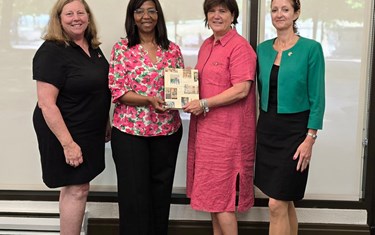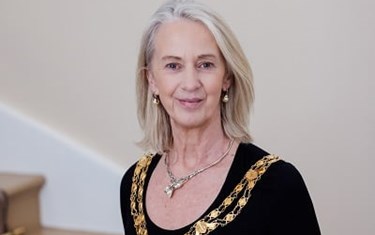Claire Stafford MRTPI is the RTPI’s Planning Practice Advisor
The European Council of Spatial Planners (ECTP-CEU) comprises 28 professional spatial planning associations and institutes from 24 European countries, alongside corresponding members. The RTPI was one of the founding members in 1985, after which this strategic network has continued to grow, with Ukraine joining in 2023.
ECTP-CEU Spring General Assembly

ECTP-CEU has two General Assembly (GA) meetings per year which rotate across different host cities around Europe, providing a great opportunity for the RTPI to collaborate on this international stage. This year’s Spring GA took place in the western limits of Europe in Galway on 12 April, designed to correspond with the Irish Planning Institute’s (IPI) 50th anniversary and their Annual Planning Conference.
Alongside a full agenda of business matters, a significant component of the day was dedicated to the election for the new ECTP-CEU Executive Committee, which occurs every four years. It was a great result from an RTPI perspective, with Richard Blyth FRTPI being voted on to the committee, giving our Institute a great footing to continue to actively shape this key international partnership. He will be replacing Janet Askew MRTPI, current Vice-President of ECTP-CEU.
A memorandum of understanding was signed with Zhejiang University in China and we also heard about ECPT’s latest involvement with the Davos Baukultur Alliance (which has been particularly active in the rebuilding efforts in Ukraine).
The next General Assembly will take place around World Town Planning Day in November in Brussels at which time the new Executive Committee will take office. It will coincide with the 13th European Planning Awards. RTPI members are encouraged to submit projects (entries are open until 5 June).
BNG knowledge exchange
I particularly enjoyed taking part in the afternoon Planning in Practice session, whereby Richard and I gave a presentation entitled: compulsory Biodiversity Net Gain in England one year on. With representatives from 16 countries across Europe present in the room, it was a perfect opportunity to reflect on this policy in action, delving in to what’s worked well and potential improvements and ultimately honing in on how we as planners can implement these positives changes.
We also had presentations on ‘Restoring Land to Nature: Strategic Approaches and Implementation in the Bucharest Dynamic Masterplan’ from Romania and on ‘Land development as a potential factor of vulnerability, land restoration, and spatial planning challenges’ from the Greek representative. The session concluded with a general discussion on how to improve nature restoration, during which the importance of positively-worded policy (of which BNG is a great trailblazer, stipulating an objective improvement in environments) was emphasised in conjunction with adaptive resilience.
Irish perspectives
IPI’s Annual Conference was held in the beautiful (and unseasonally sun-drenched!) coastal area of Salthill in Galway.

We heard from the Land Development Agency (LDA) (a commercial, state-sponsored body created to coordinate land within state control) who discussed progress on unlocking Ireland’s potential for regional housing delivery. Recent examples include Corrib Causeway, Dyke Road in Galway, a brownfield regeneration site earmarked for residential-led mixed use development.
Within the context of Ireland’s emerging National Planning Framework, during the talks there were many similarities to planning within the UK, including the urgent need for planned developments to have better alignment with infrastructure (most acutely water) and the need to overcome siloed interests of different government bodies. When questioning whether planning reform is worth it, given the inevitable upheaval and uncertainty, panellists concluded that reform must be accompanied by built-in resilience in the form of resourcing and training. As at home, the age-old balancing act of ‘good planning’ (i.e. regeneration) over viability (i.e. often greenfield sites that can be easier to deliver) remains, underlined by the ongoing call for a plan-led and not developer-led system.
We also heard from An Bord Pleanála (Ireland’s national independent planning body tasked with determining appeals and direct applications), who disclosed the extent to which the third party right to appeal has impacted on the planning system overall with wide-ranging judicial reviews.
Planning is also intrinsically linked to the local context; this came to the fore through the discussions around Irish culture and the fact that many choose to live in single dwellings in the countryside. Panellists debated how to plan for this at the parish level, given the national drive (and associated benefits) of high-density urban development. It was felt that it is important not to lose sight of Ireland’s cultural history of town and village spatial form.

The conference was concluded by tours organised by Galway City and County Councils. I learnt about the proposed port relocation and extension within central Galway city which is still under consideration. Mixed-use phased regeneration is targeted for the existing dock, designed to make this under-utilised area an enticing locality with the inclusion of event and cultural venues.
Richard participated in the county bus tour which featured a county-led urban extension project centred on a new Oranmore train station, the BIA Innovator Campus (which supports food start-ups) and a final stop at Athenry to discuss the ongoing preservation and protection of the town wall.
I thoroughly enjoyed engaging with and learning from planners from across Europe during my time in Ireland. Despite our varying planning contexts, we are united in our efforts to deliver place-based sustainable developments that serve local communities on the ground whilst simultaneously responding to shared macro issues.
All RTPI members automatically benefit from ECTP-CEU membership. Learn more here.


